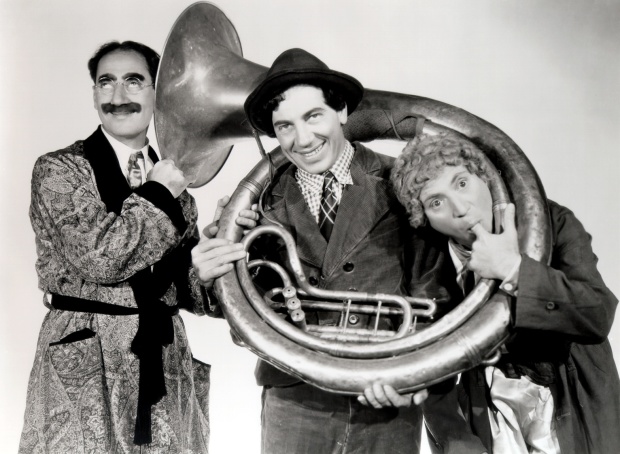You have no items in your cart. Want to get some nice things?
Go shopping“You can leave in a taxi. If you can’t get a taxi, you can leave in a huff. If that’s too soon you can leave in a minute and a huff.”

Who would have thought that film comedy would owe so much to five sons of an immigrant tailor from a pauper Jewish family in Yorkville, New York? Leonard, Adolph, Julius, Milton and Herbert would shed their modest upbringing to gain fortune and everlasting fame as Chico, Harpo, Groucho, Gummo and Zeppo. Two of them would abandon comedy in favour of business, while the other three transformed themselves into their stage personae so successfully that it is still hard to know who the real individuals behind the laughter were. Nevertheless they retained their surname amidst all their self-reinventions, and that is how history will remember them: as the Marx Brothers.
The Marx Brothers still cast a long shadow over comedy cinema. Many of early cinema’s comedians have long since been forgotten, their contributions recognised by historians but unfavoured by modern audiences who benefit from a century’s worth of fine-tuning and evolution of the comedy genre. So why do the Marx Brothers continue to shine among and above the myriad comedies produced since their heyday?
The answer, I think, lies in the difficulty of defining their brand of comedy. Most critics simply label them as ‘anarchic’, which is a true but very broad summation of their style. Put on any Marx Brothers film – yes, even the poor ones – and you will be hit by a gag rate so high its closest match is the Airplane! and Naked Gun masterpieces by Zucker, Abrahams and Zucker; who freely admit to being inspired by and occasionally ripping off the Marx Brothers. If their art is best compared to the fans inspired by them, you know there is something unique about what they do.
The secret to delivering such a relentless chain of gags is the sheer variety of them. Based on their old vaudeville routines, each film boasts a river of puns, a torrent of slapstick and a flood of musical interludes to satisfy any taste and tickle any elbow, whether crude or sophisticated. For instance, A Night At The Opera both lampoons and fondly celebrates an art-form inaccessible to many; so the film manages to appeal to both lovers and haters of opera. Of course, the film does not limit itself to opera, and therein lies the Marx Brothers’ other great asset: having such a large headline cast lets them explore many different subplots, mock many social mores and always introduce new things to the audience. Each brother has his particular skill and identity, and with so many brains contributing to the recipe that makes good comedy (not to mention the oft-unsung writers like Bert Kalmer and Harry Ruby) the films’ real challenge was editing their material down to a brutally short, but always sweet, 70 minutes. You will never be bored in a Marx Brothers film. If only today’s SNL-trained stars would pay attention to old masters…
All these jokes are strung together by plots so thin they do not really matter and become a gag in themselves, which is another delight the Marx Brothers delivered so well. This is most obvious in Duck Soup, which does not even really bother to have an ending. At the time, it was not received so well, but today is regarded as a masterpiece and possibly their finest film. The key ingredient here is satire. All their films are satirical to some degree, usually so subtly that people do not notice, but Duck Soup is so blatantly critical of politics, imperialism and war it has maintained a relevance few of their other films enjoy. Even its first scene is surprisingly unfunny: a cabinet meeting where politicians beg for more money from a wealthy widow in order to fund tax breaks and avoid civil unrest. The audience searches for a pun or gag but it is not there. We know the scene is building up towards something but we cannot be sure. Suddenly the desperate politicians agree on appointing a new leader in exchange for the money, a character we have not met yet: cut to a Groucho, rolling his eyes and cigar in hand. We laugh, initially at Groucho’s ridiculous appearance, and then at the ridiculous scenario that led to his power, and then at ridiculous potential for havoc under his leadership. The film does not disappoint – and perhaps for the only time in the Marx Brothers’ films, their anarchic comedy translates into a literal anarchy within the story.
So, where today’s comedies often suffer the burden of forcing tired jokes into hokey stories to support a solo comedian’s contained attempts at being funny for ‘family audiences’, the Marx Brothers perfected the art of creating something out of nothing. With so many fine talents pouring anything they wanted into stories that were so deliberately silly they did not matter, each film becomes a series of beautifully judged one-liners, subtle satire, side-splitting sight gags and great musical numbers wrapped inside an even bigger joke. Ultimately that may be their point: everything is a joke, so why not just make the most of it?
The BFI is currently playing a Marx Brothers season throughout January, featuring Duck Soup, A Night At The Opera, The Cocoanuts, Horse Feathers, Animal Crackers, A Day At The Races and A Night In Casablanca.
About Thomas Greylees
Thomas is a specialist in medieval religions and a part-time author. His enthusiasm for films is second only to his love for cats and long-forgotten saints. You can find his stories and articles published in H-Y journals and online.




